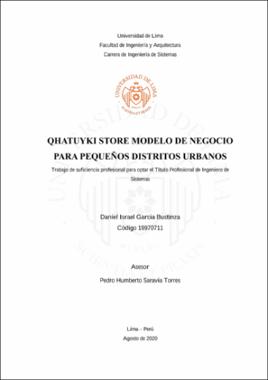| dc.contributor.advisor | Saravia Torres, Pedro Humberto | |
| dc.contributor.author | García Bustinza, Daniel Israel | |
| dc.date.accessioned | 2021-08-11T00:47:04Z | |
| dc.date.available | 2021-08-11T00:47:04Z | |
| dc.date.issued | 2020 | |
| dc.identifier.citation | García Bustinza, D. I. (2020). Qhatuyki Store modelo de negocio para pequeños distritos urbanos [Trabajo de suficiencia profesional para optar el Título Profesional de Ingeniero de Sistemas, Universidad de Lima]. Repositorio Institucional de la Universidad de Lima. https://hdl.handle.net/20.500.12724/13839 | es_PE |
| dc.identifier.uri | https://hdl.handle.net/20.500.12724/13839 | |
| dc.description.abstract | Qhatuyki Store, is the composition of the word Qhatu (Quechua of Cusco that translated into Spanish means market) with the second-person possessive suffix yki (Your Market) and the English word Store, that in the context of the Internet it is directly associated with an e-commerce or electronic commerce establishment. What Qhatuyki Store offers to the user, bilingual in a significant percentage and with strong Quechua self-identification, is the concept of a virtual market, with online stores, located in their city. That is, "your digital market to buy and sell in your own small town", through a technological platform, which allows associating small commercial establishments (many times not considered by digital entrepreneurship such as small stores, pharmacies, bazaar stores, grocery stores, etc.) with delivery carriers; to be able to offer their consumers the experience of online shopping and delivery express service, without the need to have a credit card or a bank account to make their payments. Buyer users will be able to purchase the products they need in their favorite trusted stores in their own city and receive them in the comfort of their home, work or wherever they want, in the shortest possible time. | en_EN |
| dc.description.abstract | Qhatuyki Store, es la composición de la palabra Qhatu (quechua cusqueño que traducido al español significa mercado) con el sufijo posesivo en segunda persona yki (Tu Mercado) y la palabra de origen inglés Store que literalmente significa tienda, pero en el contexto del Internet es directamente asociada a un e-commerce o establecimiento de comercio electrónico. Lo que ofrece Qhatuyki Store al usuario, bilingüe en un importante porcentaje y con fuerte autoidentificación quechua, es el concepto de un mercado virtual, con tiendas online, ubicadas en su ciudad. Es decir, “su mercado digital para comprar y vender en su misma pequeña ciudad”, a través de una plataforma tecnológica, que permite asociar a establecimientos comerciales pequeños (muchas veces no considerados por los emprendimientos digitales como bodegas, farmacias, tiendas bazar, abarrotes, etc.) con transportistas repartidores; para poder ofrecer a sus usuarios la experiencia de compra online y Servicio Delivery Express, sin necesidad de tener una tarjeta de crédito o una cuenta bancaria para hacer sus pagos. Los usuarios compradores podrán adquirir los productos que necesiten, en sus tiendas favoritas de confianza de su misma ciudad y recibirlos en la comodidad de su hogar, trabajo o donde quieran, en el menor tiempo posible. | es_PE |
| dc.format | application/pdf | |
| dc.language.iso | spa | |
| dc.publisher | Universidad de Lima | |
| dc.rights | info:eu-repo/semantics/openAccess | * |
| dc.rights.uri | https://creativecommons.org/licenses/by-nc-sa/4.0/ | * |
| dc.source | Repositorio Institucional - Ulima | es_PE |
| dc.source | Universidad de Lima | es_PE |
| dc.subject | Cloud computing | en_EN |
| dc.subject | Financial inclusion | en_EN |
| dc.subject | Electronic commerce | en_EN |
| dc.subject | Computación en la nube | es_PE |
| dc.subject | Inclusión financiera | es_PE |
| dc.subject | Comercio electrónico | es_PE |
| dc.title | Qhatuyki Store modelo de negocio para pequeños distritos urbanos | es_PE |
| dc.type | info:eu-repo/semantics/bachelorThesis | |
| thesis.degree.level | Título Profesional | es_PE |
| thesis.degree.discipline | Ingeniería de Sistemas | es_PE |
| thesis.degree.grantor | Universidad de Lima. Facultad de Ingeniería y Arquitectura | es_PE |
| dc.publisher.country | PE | |
| dc.type.other | Trabajo de suficiencia profesional | |
| thesis.degree.name | Ingeniero de Sistemas | es_PE |
| renati.advisor.orcid | https://orcid.org/0000-0002-5091-9088 | |
| renati.discipline | 612076 | |
| renati.author.dni | 10619783 | |
| renati.level | https://purl.org/pe-repo/renati/level#tituloProfesional | * |
| renati.advisor.dni | 40169354 | |
| renati.juror | Linares Barbero, Manuela | |
| renati.juror | Zevallos Luna Victoria, Guillermo | |
| renati.juror | Irey Nuñez, Jorge Luis | |
| renati.juror | Saravia Torres, Pedro Humberto | |
| renati.type | https://purl.org/pe-repo/renati/type#trabajoDeSuficienciaProfesional | * |
| dc.subject.ocde | https://purl.org/pe-repo/ocde/ford#2.02.04 | |
| ulima.cat | OI | |



